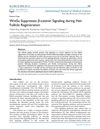Differential Effects of Wnt5a on the Proliferation, Differentiation, and Inflammatory Response of Keratinocytes
December 2017
in “
Molecular Medicine Reports
”

TLDR Wnt5a may contribute to psoriasis by reducing skin cell growth, blocking skin cell maturation, and increasing inflammation.
The study from 2017 explored the impact of Wnt5a on HaCaT keratinocytes, cells that model human epidermal behavior, particularly in the context of psoriasis. Wnt5a was shown to suppress keratinocyte proliferation, alter cell cycle progression, and downregulate genes associated with differentiation and canonical Wnt signaling. Conversely, Wnt5a upregulated genes linked to inflammatory responses, which are characteristic of psoriatic lesions. These results suggest that Wnt5a may play a role in psoriasis by inhibiting keratinocyte differentiation, promoting inflammation, and reducing cell proliferation. The experiments were conducted with varying concentrations of Wnt5a (0, 40, 80 ng/ml) and repeated four times, although the exact number of cells used was not specified. The findings indicate a potential contribution of Wnt5a to the pathogenesis of psoriasis, warranting further investigation to understand its in vivo effects and mechanisms.



